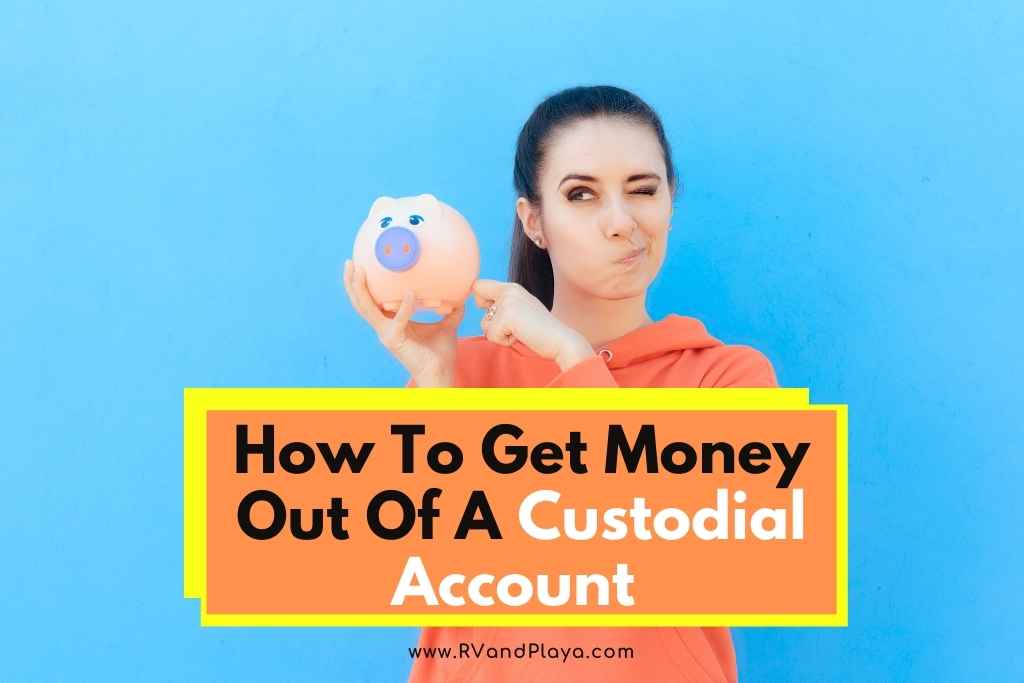Have you ever asked yourself or your friend how to get money out of a custodial account? Well, you are at the perfect place to find the answer to such a question.
Custodial accounts are typically defined as a savings account—of one type or another—held by an adult for a minor.
When that minor comes of age, which is 18 in most states, then they assume control over the account.
So, how to get money out of a custodial account? The only way to draw money from a custodial account is if it can be proven that withdrawing that money is for the benefit and in the best interests of the minor child for whom the account is being held.
It’s very easy to put money into a custodial account and much harder to pull it out.
That’s because there’s little to no burden of proof to deposit funds, or assets of any meaningful value into the account, while there is a much more substantial burden of proof required to make a withdrawal.
Of course, there’s a very good reason for that. It helps to avoid any potential exploitation of the money that was set aside for the minor.
If the parent or guardian of that minor suddenly got greedy or misspent their own funds, they can’t just go and exploit funds set aside for their child.
Table of Contents
What Do You Need To Draw Money From A Custodial Account? (Custodial Account Rules)
The most important thing that you will need if you want to draw money from a custodial account (Custodial Account Rules), is proof that the money will be spent on the minor for which the account was opened.
It’s not like a traditional bank account. It’s not like an ATM.
If you can’t prove that the money is a direct benefit for the child/minor and the child/minor only, then you simply cannot withdraw money from the account in any form or fashion.
If you are able to prove that the money is strictly to be used for the minor and then spend it on something else, you will be in violation of the law in all fifty states.
Of course, the next question might be, how do you prove that you need it for the child?
That largely depends on the financial institution through which you opened the account.
They will probably have their own means of ascertaining what is and is not considered a direct benefit to the minor in question.
Regardless, it’s important to understand that if you open a custodial account for a minor, the moment you place money into that account it is no longer your money.
It belongs to the minor for whom you opened the account.
Any use outside of that is legally stealing.
Read also: Is It Bad To Take Money Out Of Your Savings Account?
What Kind Of Custodial Accounts Are There?
There are two types of custodial accounts, each with its own methodology as to how it will operate.
The Uniform Transfer to Minors Act (UTMA) and the Uniform Gift to Minors Act (UGMA) are the two types of custodial accounts that you can open for a minor.
The difference between the two is defined by what you can put into them. UGMA accounts are used for financial deposits, such as cash, checks, stocks, bonds, mutual funds, and annuities.
UTMA accounts are assets, such as the deed to a house, real estate, car titles, and intellectual property.
While every state will allow you to open a UGMA account, the state of South Carolina is the lone state that will not allow you to open up a UTMA account.
It’s not entirely clear why that is, however, you can still open up a UGMA account in South Carolina.
What Are The Advantages Of A Custodial Account?
The primary advantage of a custodial account is that there’s no limit to what you can put into one. There are no financial limitations, on a year-to-year basis and no limitations on the assets that you can deposit.
There is also no withdrawal penalty, assuming that you can prove that the withdrawal is for the benefit of the minor. However, there may be tax penalties down the road for assets or cash withdrawn in the minor’s name.
Since custodial accounts are legally owned by the child, regardless of the fact that an adult controls it, there are limitations on how much the government can tax the child’s assets.
So long as you and your child file their taxes on your return, they are taxed at the reduced tax rate.
This falls under the unearned income bracket and is very useful in providing a small tax umbrella with custodial accounts.
It’s not a tax shelter, so we’ll stick with the term “umbrella” for now.
What Happens To A Custodial Account When The Minor Is Of Age?
When your child, or the minor for whom you opened the account for and control in their interest, turns 18—21 in some states—the account is automatically transferred into their ownership and you will lose all control whatsoever.
That’s why parents often set up 529s instead of custodial accounts because a 529 account is your account and never transfers ownership to the minor, even after they come of age.
Imagine transferring ownership of an account with $50,000 in cash or assets over to an 18-year-old? Well, worse things have happened in this world but probably not by much.
Is Opening a 529 Account The Better Option?
A 529 account is essentially a savings account for tuition, college, or K-12 education expenses only.
The difference between a 529 and a custodial account is that a 529 remains in your control, even when the minor in question comes of age.
A 529 account can only be withdrawn from in order to pay for the minor/child’s educational expenses, including college tuition, dorm room expenses, lab fees, school supplies, busing fees, and anything else that directly involves their educational requirements.
All Things Considered
If you need to withdraw funds from a custodial account, be sure that you can prove that the funds will be spent on the minor and the minor only.
Legally, there is no other way to withdraw funds from this type of account, whether it’s a UGMA or a UTMA.
The purpose of these two custodial accounts is clear, that they are a direct benefit for your child and, although you will control it while they are minors, the account, along with the funds within, do not belong to you.
Here are some of my favorite services, products, and Stores
I created this resource page to easily list recommended services, products, and companies that I use and/or those I know are valuable.
This way you can quickly find great products and services all in one place. You can save thousands of dollars all from one page!
There are affiliate links, so if you do decide to use any of them, I´ll earn a small commission. But in all honesty, these are the exact what I use and recommend to everyone, even my own family.
+ Products & Services
+ Earn More
+ Save Thousands of Dollars
+ Live More
References
https://www.sec.gov/reportspubs/investor-publications/investorpubsintro529htm.html
https://youngandtheinvested.com/custodial-account-rules/
Recent Posts
Is It Bad To Take Money Out Of Your Savings Account? (Updated!)
Do you know if it is bad to take money out of your savings account? this is one of the questions our readers ask a lot. Well, we´ve got you covered. You only ever open a savings account, for one...
Have you ever wondered if Kroger does cash checks? Well, look no more. We´ve got you covered. Bernard Kroger founded Krogers all the way back in 1883 and today Krogers is the second-largest...


